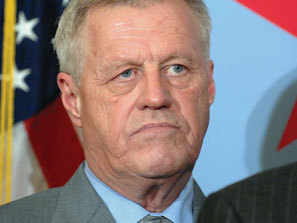Local and organic food advocates cheer Congressman's change of heart over future Farm Bill

Almost three years after publicly ridiculing local and organic food consumers, representative Collin Peterson (D-MN) stands to be a potential champion of a movement he, admittedly, understood little about. What a difference an economic downturn (and grassroots populism) can make for a House Agriculture Committee Chairman's social and political perspective.
I guess the good Congressman has since done his homework. I'm sure a tenacious letter writing campaign by local and organic food advocates in response to his criticisms helped sway him a bit.
On Wednesday, Peterson announced the committee's openness to modifying the decades-old farm subsidy model continued through the 2008 Farm Bill, wherein 70 percent of farm payments go to the wealthiest 10 percent of commodity growers – agribusinesses producing corn, soy, cotton, rice or wheat. All the while small farmers/ranchers and growers of “specialty crops” receive little federal money.
The Farm Bill is a conglomeration of legislation, revised every 5 years or so, which dictates the terms of federal support for farmers, amongst other social programs related to agriculture. In 2008, Congress revised the law with what Peterson sees as "elements we need to look at for the future." He's referring to a “crop insurance” program which protects farmers from not only low prices, but low yields as well.
Now, to a student of the Austrian School of economics (like myself), the current dynamic of direct subsidies for commodities, which increases supply, acting concurrently with price supports to guarantee payments at prices artificially lowered by said subsidies, shows itself to be a raw deal. But it seems “officialdom” sees the light and are willing to turn back the clock to a simpler time, before the self-defeating economic logic of the Green Revolution.
In an interview following Wednesday's hearing, Peterson insinuated that 2012's Farm Bill will begin a gradual phasing out of conventional, direct subsidy payments to farmers while transitioning to a model of crop insurance programs which focus less on mono-cropped commodities and more on revenue protection for diversified farms.
"Is it right to be doing by commodity, or should we be doing this with whole-farm type of situation with crop insurance and revenue?" asked Peterson. Adding, to the surprise of activists in the local food movement, “You know, that would be a much more market-oriented type of approach where you could cover your own risk, but the decisions within what you do within your farm are your decisions, not some type of program you are planting towards.”
Such a plan could provide the incentive industrial farmers need to diversify, spreading out their risks, and by incremental steps, move towards incorporating their more variegated product into local food economies.
This “new” policy of ending direct subsidies could also encourage a resurgence in the number of family farms as younger generations would no longer be fiscally discouraged from beginning farms of their own. Consider Peterson's insightful question: “Are these direct payments being capitalized into land values and rents? And is that making it more difficult for young farmers to get started?”
It's a sad state of affairs when it takes an economic depression to force lawmakers to look ahead toward food policy which encourages farmers to operate more sustainably and ecologically. There is no doubt the impetus for this paradigm shift in farm policy has been agitated by budgetary concerns. Calling the passage of a status-quo farm bill in 2012 “inadequate,” Peterson said, “for one thing, there will not be enough money to increase crop subsidy rates as high as some backers want.”
There is reason to hold out hope that, in fact, the whole world hasn't gone mad and that even Washington politicians will listen to the grassroots when the financial stakes are high enough. “What I’ve told people is that they should put everything on the table and we’ll look at it,” says Peterson.
The end of the detrimental direct subsidy for agricultural commodities might not be in our immediate future. Selling a less disastrous price support program to urban, local-food-minded voters will be a point of compromise between them and rural agribusinesses who command a powerful lobby. But, as the saying goes, there's no stopping an idea whose time has come.
As part of a four-part series of field meetings, the House Agriculture Committee will give Californians a chance to weigh in on the direction of federal farm legislation at a Fresno City Hall hearing scheduled for the 3rd of May.




